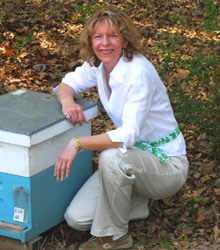Jennifer Berry

Jennifer Berry: Apicultural Research Coordinator and Lab Manager at the University of Georgia
For over 23 years, Jennifer Berry has been the Apicultural Research Professional and Lab Manager for the University of Georgia Honey Bee Program. Her research objectives have
focused on queen breeding, improving honey bee health, the sub-lethal effects of pesticides on beneficial insects and IPM techniques for varroa and small hive beetle control,
weeds for bees, and what best to plant in non-traditional horticultural landscapes to enhance pollinator populations and diversity. Recently she has become a PhD student
and is teaching the “Bees, Beekeeping and Pollinator Conservation” course at UGA.
Jennifer has also undertaken several ambitious extension campaigns to educate people from all walks of life. She volunteers in Central and South America to teach women
and young teens the art of beekeeping so they may start a business or enhance opportunities for better employment. Jennifer has also been instrumental in launching the
Georgia Beekeeping Prison Program. Since its inception, 8 prisons have been added to the fold and are now teaching beekeeping behind bars. Along with learning how to
keep bees, inmates are also certified through the University of Georgia Master Beekeeper Program. To date over 160 inmates have become certified beekeepers with several
advancing to Journeyman and Master Beekeeper. She is also dutifully educating the public about the importance of pollinators and other beneficial insects and how to
encourage their populations in their own front and back yards.
Education
B.S., 1997, University of Georgia, Entomology
M.S., 2000, University of Georgia, Entomology
Publications
Jennifer has written numerous academic publications as well as articles for
Bee Culture Magazine.
A full list with pdfs can be found on the
UGA's website.